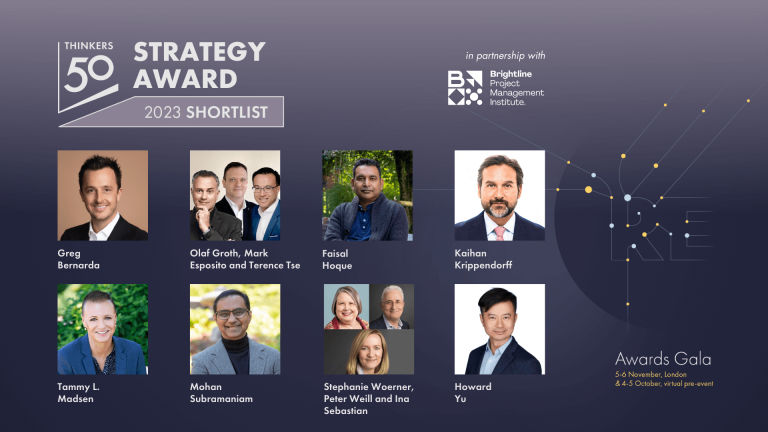

 Eventually, strategists inevitably feel cramped by coming up with neat strategies for corporations – however multinational they might be. They crave a bigger stage. Michael Porter has tackled strategy in the healthcare industry – notably in a series of articles co-authored with Harvard colleague Mark Kramer. Porter has also squared the capitalist circle by showing how companies can combine their competitive instincts with social responsibility and other activities that while socially beneficial do not appear to contribute to shareholder value.
Eventually, strategists inevitably feel cramped by coming up with neat strategies for corporations – however multinational they might be. They crave a bigger stage. Michael Porter has tackled strategy in the healthcare industry – notably in a series of articles co-authored with Harvard colleague Mark Kramer. Porter has also squared the capitalist circle by showing how companies can combine their competitive instincts with social responsibility and other activities that while socially beneficial do not appear to contribute to shareholder value.
Perhaps Porter’s most successful foray into other corners of the strategy world was his work on competition and countries. His 1990 book, The Competitive Advantage of Nations, must be ranked as one of the most ambitious books of our times. At its heart was a radical new perspective on the role and raison d’être of nations. Porter charted their transformation from being military powerhouses to economic units whose competitiveness is the key to power and influence.
Richard D’Aveni is another strategy thinker who has continued to find new facets of strategy to explore. Most recently, in his 2012 book Strategic Capitalism, he scaled up the target of his strategic analysis. Like Porter before, and number of strategists, D’Aveni has shifted his unit of analysis from business or firm, to government and nation, and ultimately to entire economic systems. Thus, in the book he is concerned with hypercompetition between various forms of capitalism, and the economic power struggle between nations and economic power blocs. In particular, D’Aveni is interested in the different models of capitalism being pursued by the US and China.
The word iconoclast is over-used, but not in the case of Richard D’Aveni. D’Aveni is a contrarian. One of the reasons we like his work is that he looks at the world differently and dares to challenge the orthodoxy. His analysis is controversial. It is as provocative as it is refreshingly unflinching.
D’Aveni notes that a constant stream of headlines from China indicate that corporate America is under attack. When we talked to him he pointed to two examples: the Bo Xilai scandal — a story that illustrated how business interests in China are tied up with affairs of the state. The second was the Fed had just approved three state-owned Chinese banks to move into U.S. markets.
“What we are witnessing, in my view, is an escalation from competition between corporations to competition between nations. The struggle between China and the U.S. amounts to the opening moves of a Capitalist Cold War,” D’Aveni told us with characteristic gusto. “With the rise of the new economic powerhouses, especially China, we are seeing a new form of capitalism where states compete against other states — or more accurately their forms of capitalism compete with each other for economic success.”
D’Aveni describes the new reality as hypercompetition between nations. This new reality is characterized by, “a series of actions by rival nations seeking to tilt the playing field to their advantage—in effect to set the rules of competition. It also comprises moves and countermoves to disrupt or undermine the form of capitalism used by rivals. We have seen it before”.
D’Aveni points to corporate Japan’s development in the 1970s and 1980s of a form of managed capitalism that featured domestic industry groups called keiretsu and informal zaibatsu (outlawed after World War II). They sought not to maximize corporate profits in the short run; they sought to maximize employment in Japan and reinvestment in the long-term growth of the groups. This brand of capitalism was not capitalism as practiced and understood in the West.
So, what can American and other Western companies do to raise their game, to understand the new strategic stakes? “Now is not the time to rely on ideological or theory-based ideas that encapsulate what used to work. Most ideologies and theories are not appropriate anymore. They freeze our thinking, paralyze our ability to adjust, and doom American companies to continued deadlock and decline. Only a fool continues doing the same thing and expects different results,” warns D’Aveni
“In Strategic Capitalism, I urge America’s business leaders to look at the future strategically, and to craft a strategy for winning over the long term. It does not promote ideology, whether from the left, right, or center. It promotes pragmatic thinking that comes from anyone with good ideas.”
Resources
Richard D’Aveni, Strategic Capitalism, McGraw Hill, 2012
This was originally published in What we mean when we talk about strategy by Stuart Crainer and Des Dearlove (Infinite Ideas, 2016).

Thinkers50 Limited
The Studio
Highfield Lane
Wargrave RG10 8PZ
United Kingdom

Thinkers50 Limited
The Studio
Highfield Lane
Wargrave RG10 8PZ
United Kingdom

| Cookie | Duration | Description |
|---|---|---|
| LANG | 9 hours | Linkedin set this cookie to set user's preferred language. |
| nsid | session | This cookie is set by the provider PayPal to enable the PayPal payment service in the website. |
| sp_landing | 1 day | The sp_landing is set by Spotify to implement audio content from Spotify on the website and also registers information on user interaction related to the audio content. |
| sp_t | 1 year | The sp_t cookie is set by Spotify to implement audio content from Spotify on the website and also registers information on user interaction related to the audio content. |
| tsrce | 3 days | PayPal sets this cookie to enable the PayPal payment service in the website. |
| x-pp-s | session | PayPal sets this cookie to process payments on the site. |
| __cf_bm | 30 minutes | This cookie, set by Cloudflare, is used to support Cloudflare Bot Management. |
| Cookie | Duration | Description |
|---|---|---|
| l7_az | 30 minutes | This cookie is necessary for the PayPal login-function on the website. |
| Cookie | Duration | Description |
|---|---|---|
| CONSENT | 2 years | YouTube sets this cookie via embedded youtube-videos and registers anonymous statistical data. |
| _ga | 2 years | The _ga cookie, installed by Google Analytics, calculates visitor, session and campaign data and also keeps track of site usage for the site's analytics report. The cookie stores information anonymously and assigns a randomly generated number to recognize unique visitors. |
| _gat_gtag_UA_10408481_1 | 1 minute | Set by Google to distinguish users. |
| _ga_ZP8HQ8RZXS | 2 years | This cookie is installed by Google Analytics. |
| _gid | 1 day | Installed by Google Analytics, _gid cookie stores information on how visitors use a website, while also creating an analytics report of the website's performance. Some of the data that are collected include the number of visitors, their source, and the pages they visit anonymously. |
| Cookie | Duration | Description |
|---|---|---|
| NID | 6 months | NID cookie, set by Google, is used for advertising purposes; to limit the number of times the user sees an ad, to mute unwanted ads, and to measure the effectiveness of ads. |
| test_cookie | 15 minutes | The test_cookie is set by doubleclick.net and is used to determine if the user's browser supports cookies. |
| VISITOR_INFO1_LIVE | 5 months 27 days | A cookie set by YouTube to measure bandwidth that determines whether the user gets the new or old player interface. |
| YSC | session | YSC cookie is set by Youtube and is used to track the views of embedded videos on Youtube pages. |
| yt-remote-connected-devices | never | YouTube sets this cookie to store the video preferences of the user using embedded YouTube video. |
| yt-remote-device-id | never | YouTube sets this cookie to store the video preferences of the user using embedded YouTube video. |
| yt.innertube::nextId | never | This cookie, set by YouTube, registers a unique ID to store data on what videos from YouTube the user has seen. |
| yt.innertube::requests | never | This cookie, set by YouTube, registers a unique ID to store data on what videos from YouTube the user has seen. |
| Cookie | Duration | Description |
|---|---|---|
| DEVICE_INFO | 5 months 27 days | No description |
| loglevel | never | No description available. |
| m | 2 years | No description available. |
Thinkers50 Limited has updated its Privacy Policy on 28 March 2024 with several amendments and additions to the previous version, to fully incorporate to the text information required by current applicable date protection regulation. Processing of the personal data of Thinkers50’s customers, potential customers and other stakeholders has not been changed essentially, but the texts have been clarified and amended to give more detailed information of the processing activities.